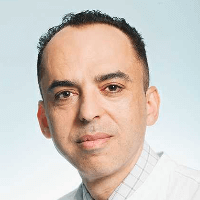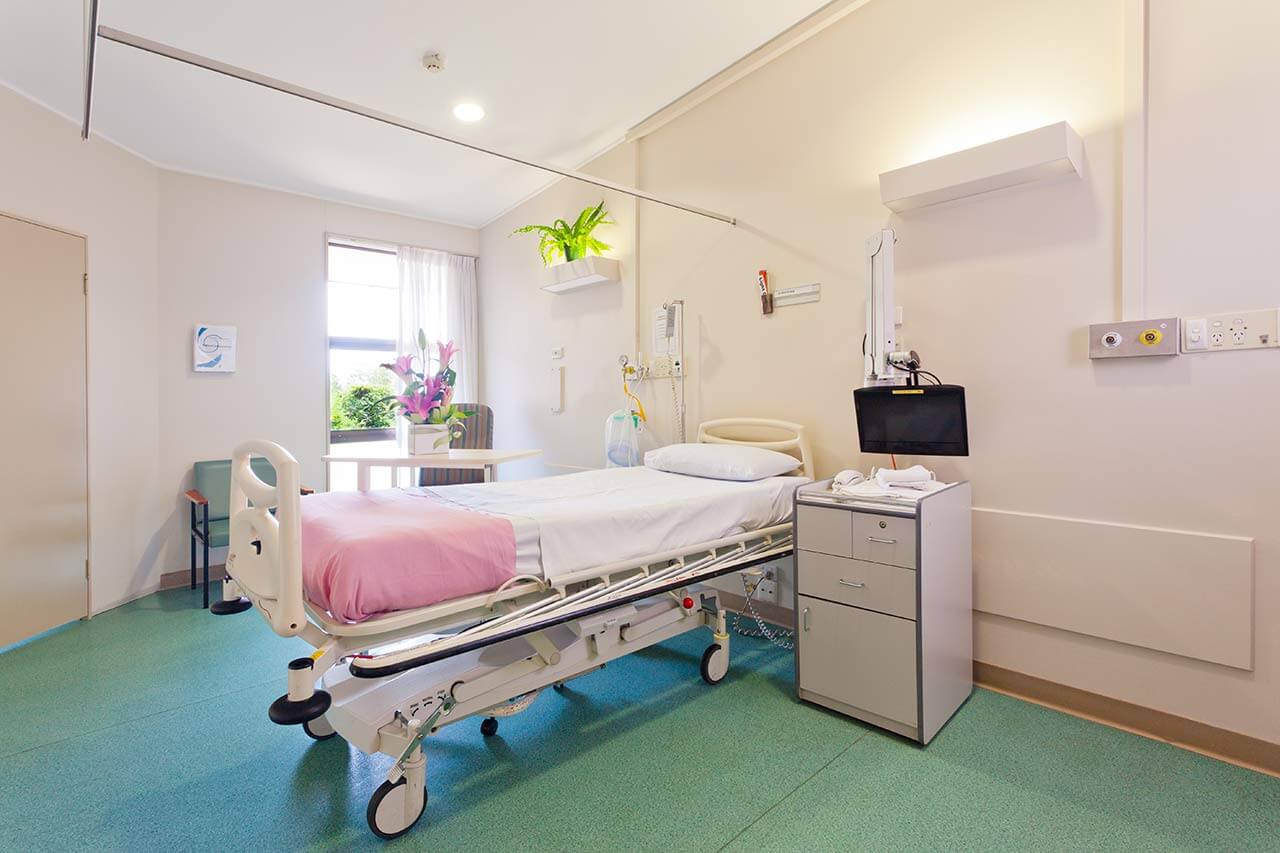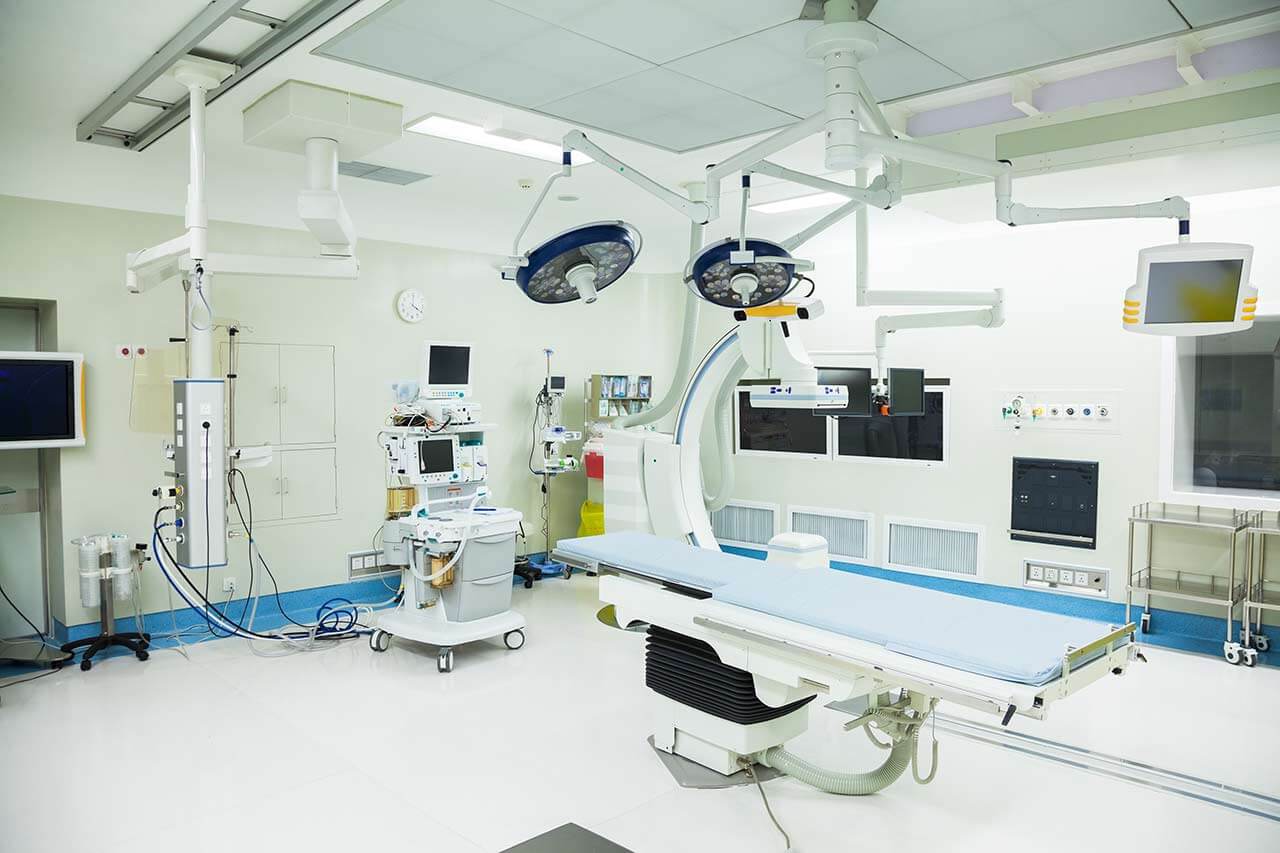
The program includes:
- Initial presentation in the clinic
- clinical history taking
- physical examination
- review of medical records
- laboratory tests:
- complete blood count
- general urine analysis
- biochemical analysis of blood
- indicators of inflammation (CRP, ESR)
- indicators blood coagulation
- abdominal ultrasound
- gastroscopy with biopsy
- analysis of hp (helicobacter pylori)
- CT/MRI abdomen
- preoperative care
- resection of diverticulum
- symptomatic treatment
- control examinations
- the cost of essential medicines and materials
- nursing services
- nutrition recommendations
- full hospital accommodation
- explanation of future recommendations
Required documents
- Medical records
- Fibrogastroduodenoscopy (FGDS) (if available)
Service
You may also book:
 BookingHealth Price from:
BookingHealth Price from:
About the department
The Department of General, Abdominal, Endocrine, Minimally Invasive and Bariatric Surgery at the Hospital Bogenhausen Munich offers the full range of services in the areas of its specialization. The department's surgeons perform interventions on the abdominal organs, thyroid gland and adrenal glands. Of particular interest is the treatment of cancers. The department is certified as the Colon, Esophageal and Pancreatic Cancer Center by the German Cancer Society. In addition, the department provides the surgical treatment of morbid obesity. The specialists of the medical facility keep pace with innovations, so most of the operations in the department are performed using sparing minimally invasive techniques. When performing laparoscopic operations, surgeons make only a few small skin incisions, which significantly reduces the risk of complications during and after surgery, while postoperative recovery takes less time. Such surgical procedures contribute to mild pain and almost do not leave scars. The department also offers robot-assisted surgery. Medical care is provided in cooperation with gastroenterologists and endocrinologists, which guarantees an integrated approach. The Chief Physician of the department is Prof. Dr. med. Ayman Agha.
The department widely uses robot-assisted surgery, which is an innovation in modern medicine and allows the doctors to perform surgical procedures with pinpoint accuracy and minimal trauma to healthy tissues. In 2019, the department started using the state-of-the-art da Vinci XI robotic system for sparing, but highly effective surgical treatment of abdominal diseases. The department successfully performs robotic interventions for gastrointestinal cancers, pancreatiс diseases and colorectal pathologies. In addition, the da Vinci XI robotic system allows the specialist to perform effective surgical treatment of gastroesophageal reflux disease, left-sided pancreatic resection, resection of liver and adrenal tumors. As in classic laparoscopic surgery, when performing robot-assisted surgery, the surgeon makes only a few small skin incisions through which he inserts special surgical instruments and a miniature video camera. All surgical manipulations are performed by a robot, but it follows the orders of a specially trained surgeon who sits at the control panel of the device and studies images of the operating field in multiple zooming. The main advantage of the da Vinci surgical system is its impeccable precision. The surgeon can clearly see all the anatomical structures in the surgical field, including nerves and blood vessels, so the functional results of the operation are significantly improved. It is also important that after robotic surgery the patient recovers as soon as possible and does not experience severe pain.
The department's surgeons often admit patients with cancers of the gastrointestinal tract and liver. The department's medical team annually performs over 400 operations for colon cancer and more than 50 operations for pancreatic, stomach and esophageal cancers. The department's competence also includes the treatment of peritoneal carcinomatosis. The patients with such a diagnosis can undergo not only surgery to remove the tumor, but also hyperthermic intraperitoneal chemotherapy (HIPEC), which is available only in the best medical facilities of Europe. The HIPEC procedure is performed immediately after tumor resection and involves injecting heated chemotherapy drugs directly into the abdominal cavity. Such an approach allows the specialists to completely destroy metastases and tumor cells invisible to the surgeon's eye. The high effectiveness of hyperthermic intraperitoneal chemotherapy has been confirmed by clinical trials. Cancer treatment requires an interdisciplinary approach, and therefore a treatment regimen for each patient is developed during tumor boards with the participation of specialists from related medical fields. The department's surgeons have long experience, while many tumor resection procedures are performed using minimally invasive techniques, which is an undeniable advantage for the patient.
In the field of endocrine surgery, the focus is on the treatment of thyroid and adrenal diseases. In order to exclude damage to the recurrent laryngeal nerve located in the immediate vicinity of the thyroid gland, the department's specialists use intraoperative monitoring. The department's surgeons can boast of a special competence in the treatment of nodular goiter and thyroid cancer. The basis of cancer therapy is surgical removal of the thyroid gland, which is often complemented by radioiodine therapy. The department also provides treatment for thyrotoxicosis. When treating patients with such a diagnosis, endocrinologists are involved in the therapeutic process. The specialists initially try to compensate for the disease with the help of drugs. If drug treatment does not give the desired result, the patient is indicated for surgery. The team of the department's doctors also specializes in the surgical treatment of adrenal adenomas, Cushing's syndrome, pheochromocytomas and hormonally inactive adrenal tumors. Whenever possible, minimally invasive surgery is preferred.
The department's surgeons admit patients with morbid obesity. In this field, the specialists cooperate closely with the Department of Endocrinology, Diabetology, Angiology and Obesity Treatment, which offers special weight loss programs, including diet therapy, an individually selected complex of dosed physical activities, behavioral therapy and qualified psychological care. Bariatric surgery is the last-line treatment, and therefore the department's doctors resort to it only in severe cases, when conservative methods do not help to get rid of excess weight, which carries risks to the patient's health. The department's surgeons specialize in gastric sleeve surgery, gastric bypass surgery, gastric banding and intragastric balloon placement. In rare cases, biliopancreatic diversion (Scopinaro procedure) can be performed.
The department's range of surgical services includes:
- General and abdominal surgery
- Surgical treatment of cancers
- Colon cancer surgery
- Stomach cancer surgery
- Pancreatic cancer surgery
- Esophageal cancer surgery
- Liver cancer surgery, including resection of liver metastases
- Peritoneal carcinomatosis surgery, including hyperthermic intraperitoneal chemotherapy (HIPEC)
- Surgical treatment of gallstones, inflammatory gallbladder diseases
- Surgical treatment of inflammatory bowel disease (Crohn's disease and ulcerative colitis)
- Surgical treatment of inguinal hernias and epigastric hernias
- Surgical treatment of diverticulitis
- Surgical treatment of proctologic diseases (pathologies of the rectum and anus)
- Appendectomy
- Surgical treatment of cancers
- Endocrine surgery
- Surgery for thyroid diseases
- Nodular goiter
- Hyperthyroidism
- Thyroid cancer
- Surgery for adrenal diseases
- Adenomas
- Cushing's syndrome
- Pheochromocytoma
- Hormonally inactive tumors
- Surgery for thyroid diseases
- Bariatric surgery
- Sleeve gastrectomy
- Gastric bypass surgery
- Gastric banding
- Intragastric balloon placement
- Biliopancreatic diversion (Scopinaro procedure)
- Minimally invasive and robot-assisted surgery, including for resection of malignant gastrointestinal tumors
- Other medical services
Curriculum vitae
Higher Education
- 1985 - 1987 Study of Human Medicine at the University of Bonn.
- 1987 - 1993 Study of Human Medicine at the Friedrich-Alexander University Erlangen-Nuremberg.
Professional Career
- 1993 - 1995 Internship in the Department of Surgery at the University Hospital Regensburg.
- 1993 - 1996 Assistant Physician in the Department of Surgery at the University Hospital Regensburg.
- 1997 Admission to medical practice.
- 1997 Research Fellow in the Department of Surgery at the University Hospital Regensburg.
- 2000 Board certification in Surgery.
- 2000 Senior Physician in the Department of Surgery at the University Hospital Regensburg.
- 2004 Specialization in Abdominal Surgery.
Research Career
- 1997 Doctoral thesis defense. Subject: "The influence of therapeutic plasma exchange on the clinical picture and profile of cytokines in patients with acute necrotizing pancreatitis".
- 1998 Internships and training courses in laparoscopic surgery (Teubingen, Goettingen, Berlin, Norderstedt, Tuttlingen, Zell am See, Hall in Tirol).
- Since 1998 Institutionalization of advanced laparoscopic surgical techniques in the practice of abdominal surgeons, particularly, the institutionalization of minimally invasive surgical techniques for benign and malignant colon diseases.
- 1996 - 1999 Prospective randomized examination of the J-pouch in comparison with coloanal anastomosis for distal rectal cancer.
- Since 1999 Development and monitoring of clinical trials in colorectal surgery.
- Since 2002 Introduction of new minimally invasive surgical techniques of rectal resection with the formation of J-pouch in the treatment of ulcerative colitis and familial adenomatous colon polyposis.
- Since 2003 Development of innovative differentiated minimally invasive surgical techniques (with retroperitoneoscopic access) for the treatment of adrenal tumors.
- Since 2002 Development of image-guided surgical procedures for the treatment of diseases of the thyroid and parathyroid glands.
- Since 2004 Leader of the research project for minimally invasive surgery.
- Since 2005 Introduction of new laparoscopic techniques for mobilizing left flexure of colon during laparoscopic resection of the rectum.
- Since 2005 Regular organization of seminars on endocrine and colorectal surgery with live broadcast of operations.
- Since 2006 Active participation in international congresses on laparoscopy with live broadcast of operations.
- 03.2008 Habilitation. Subject: "Laparoscopic rectal resection in rectal cancer: technical implementation and results".
- Since 2008 Regular (once every 3 months) internships with operations in the field of minimally invasive endocrine surgery with live broadcast.
- Since 2009 Implementation of the single-port surgical technique.
- 01.2011 Coordinator of Bowel Cancer Center, Regensburg.
- 02.2011 Managing Senior Physician, Department of Surgery.
- 07.2012 Extraordinary Professor (ahead of schedule).
- 11.2012 Chairman of the Surgical Working Group for Endocrinology (CAEK) in Regensburg.
- 08.2012 Acting Head of the Department of Surgery at the University Hospital Regensburg.
- 04.2013 Deputy Head of the Department of Surgery at the University Hospital Regensburg.
- Since 03.2014 Head of the Department of General, Abdominal, Endocrine, Minimally Invasive and Bariatric Surgery at the Hospital Bogenhausen Munich.
International Activity
- Regular training courses in laparoscopic colorectal surgery at the Alexea Training Center, Alexandria, Egypt.
- Coordination of the partnership between the University Hospital Regensburg and Alexandria University, Egypt.
- Training of foreign surgeons for board certification in surgery.
- Minimally invasive colorectal and endocrine interventions with live broadcast at international conventions.
Clinical Interest
- Minimally invasive surgery for benign and malignant colon diseases (in particular for diverticulitis and rectal cancer, Crohn's disease and ulcerative colitis, rectal prolapse).
- Minimally invasive surgery for esophageal diseases (in particular for gastroesophageal reflux disease, malignant tumors, achalasia cardia).
- Minimally invasive surgery for pancreatic diseases (in particular for pancreatic tumors).
- Minimally invasive trans- and extraperitoneal access to the adrenal glands (for all types of benign and malignant tumors).
- Minimally invasive surgery for thyroid and parathyroid diseases.
- Minimally invasive surgery for spleen removal (in particular for lymphoma or idiopathic thrombocytopenic purpura).
Awards, Prizes and Other Honors
- 1997 Poster Award (twice), European Pancreatic Club (EPC) Meeting, King's College London.
- 2007 Poster Award, Meeting of the Surgical Working Group for Endocrinology (CAEK), Mainz.
Memberships in Professional Societies
- German Society of Surgery.
- Bavarian State Medical Association.
- Professional Association of German Surgeons.
- Working Group for Minimally Invasive Surgery (CAMIC).
- Surgical Working Group for Endocrinology (CAEK).
- German Society for General and Abdomianl Surgery.
Photo of the doctor: (c) München Klinik Bogenhausen
About hospital
According to the reputable Focus magazine, the Hospital Bogenhausen Munich ranks among the ten best medical centers in Bavaria and among the top 50 medical facilities in Germany!
The medical facility is the Academic Hospital of Ludwig Maximilian University of Munich. The modern hospital with the highest level of services annually provides treatment to more than 85,000 patients with clinical cases of varying severity. With 1,000 beds, the hospital is the largest medical complex in the region. It provides both inpatient and outpatient treatment. In addition, the hospital has a 24-hour emergency service. The hospital's medical team consisting of highly qualified doctors and nursing staff focuses on tailored medical care, since they are convinced that every patient and his clinical case is unique. All employees of the hospital strive not only to provide the most effective treatment to the patient, but also to make his hospital stay as comfortable as possible. The work of doctors is based on respect and humane attitude towards their patients.
The hospital includes 18 specialized departments. Each department is responsible for the treatment of a particular group of diseases. The hospital is distinguished by outstanding successes in the treatment of diseases of the cardiovascular system, lungs and airways, gastrointestinal tract, musculoskeletal system, nervous system and metabolic disorders. Of particular interest is the treatment of cancers, which is provided on the basis of the Cancer Center certified in accordance with the standards of the German Cancer Society. The doctors of the hospital have a large arsenal of innovative treatment methods available only in the leading medical centers in Europe.
The high level of medical care is confirmed by the prestigious certificates of professional german medical societies. These are certificates of the German Cancer Society in the treatment of colon, pancreatic and esophageal cancers, a certificate of the German Cardiac Society, a certificate of the German Trauma Society, a certificate of the German Stroke Society and others.
The hospital has excellent conditions for the provision of comprehensive medical care. Long clinical experience of doctors in combination with high-tech medical equipment allows the specialist to work miracles, curing severe diseases, which doctors from other hospitals cannot cope with. The specialists of the hospital take care of both the physical health of patients and their emotional state, devoting enough time to personal communication. The efforts of the medical team are aimed at providing the patient with the most effective treatment and at completу cure of pathology, if possible.
Photo: (с) depositphotos
Accommodation in hospital
Patients rooms
The patients of the Hospital Bogenhausen Munich live in comfortable and cozy rooms with light colors. The hospital offers accommodation in single and double patient rooms. Each patient room has an ensuite bathroom with shower and toilet. The hospital also has patient rooms specially equipped for disabled people. The standard patient rooms include an automatically adjustable bed, a bedside table, a wardrobe, a table and chairs for receiving visitors. The patient rooms have Wi-Fi.
The hospital also offers enhanced-comfort patient rooms with a safe, a mini fridge and upholstered furniture.
The hospital has a library with many interesting books, magazines, CDs and DVDs. For the convenience of patients, the hospital also houses a small shop, a hairdresser and a cafe on its territory.
Meals and Menus
The patient and the accompanying person are offered tasty and healthy three meals a day. The diet is quite varied. Only fresh and high-quality products are used when cooking. Breakfast and dinner are usually served buffet style, while for lunch one can choose from three menus, including a dietary one.
If you are on a specific diet for some reason, you will be offered an individual menu. Please inform the medical staff about your dietary preferences prior to the treatment.
Further details
Standard rooms include:
Religion
The religious services are available upon request.
Accompanying person
During the inpatient program, the accompanying person can live with the patient in a patient room or a hotel of his choice. Our managers will help you choose the most suitable option.
Hotel
During the outpatient program, the patient can stay at the hotel of his choice. Our managers will help you choose the most suitable option.




